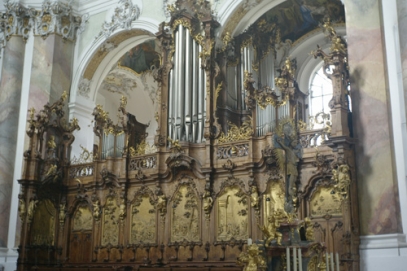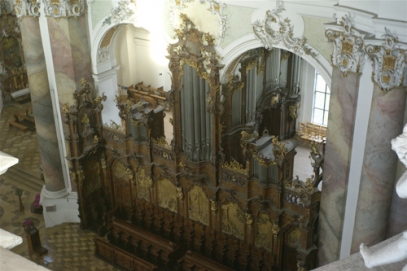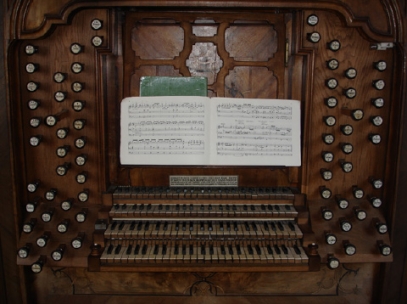 |  |  |
Ottobeuren, Dreifaltigkeitsorgel and Heilig Geist Orgel
Karl Joseph Riepp 1755-66
In Ottobeuren abbey there are three organs at present: besides a modern instrument by Steinmeyer 1957 (Klais 2001/2002), there are the two 18th c. choir organs by Riepp, above the stalls designed by Marin Hörmann and carved by Joseph Christian . Although started in 1755 and the Heilig Geist organ completed in 1762 it took another four years to finish the Dreifaltigkeitsorgel causing a delay for the millenial celebrations of the abbey by two years.
After Riepps death in 1775 his pupil Johann Nepomuk Holzhay cared for maintenance. In 1787 he had a first major task, retuning the instruments, since Riepp obviously had tuned the instruments to a low French chamber pitch (maybe c. 400 Hz-ish) making orchestra cooperation difficult, so Holzhay shortened all the pupes by a semitone, probably including adapting the reeds. Therefore the modern sound of the instrument largely represents Holzhay's work. In 1862 the Dreifaltikeitsorgel was renovated by Joseph Bohl of Augsburg by replacing the old bellows by a magazine and replacing the French pedal by a German size one.. In 1914 and 1922 Steinmeyer restored both organs in some of the first organ restorations following modern conservation standards.
Music sample:
Georg Muffat : Toccata secunda
played by Joseph Miltschitzky
Specification
Dreifaltigkeitsorgel (right)
IV+P; manuals C-d3 , divided at f#1 / g1, pedal C-c1
Positif
Prinzip 16’
(D only)
Flauta 8’
Coppel 8’
Oktav 4’
Flet 4’
Gamba 4’
Nazard 2
2/3’
Quart 2’
Tertz 1
3/5’
Quint 1
1/3’
Fornit 5-6 f.
Trompet 8’
Cromor 8’
Voxho 8’
Clairon 4’
HW
Copel 16’
Prinzip 8’
Flauta 8’
Salicet 8’
Gamba 8’
Copel 8’
Prestant 4’
Flet 4’
Tertz 3 1/5’
Quint 2 2/3’
Waldflöte 2’
Tertz 1 3/5’
Mixtur 2
2/3’ 4f.
Cimbal 1’ 4-6f.
Cornet 5
f. (D)
Trompet 8’
Clairon 4’
Récit
Cornet resi 5 f. (from g0)
Écho
Copel 8’ *
Flet 4’ *
Quint 2 2/3’
(B only) *
Larigot 2 2/3’+2’
(D only))
Quart 2’ *
Tertz 1
3/5’ (B only) *
Tertz 1
3/5’+1’ (D only)
Hoboi 8’
(* Those stops also playable on Recit supplementing the Cornet resi below g0)
P
Prinzip 16’
Copel 16’
Oktav 8’
Gamb 8’
Quint 5 1/3’
Flet 4’
Mixtur 2 2/3’ 3f.
Bomba 16’
Trompet 8’
Trompet 4’
Coupler HW/Pos
Tremolo forte and dous for I, resp. for II+III+IV
Wind pressure: 80 mm WS
Heilig-Geist-Orgel (left)
II+P; manuals C-d3 , divided at f#1/g1, pedal C-c1
Positif
Copel 8’
Flauta 8’
Prestant 4’
Flet 4’
Quint 2 2/3’
Doublet 2’
Mixtur 4f.
Cornet 3f.
Schalmei 8’
HW
Copel 16’
Prinzipal 8’
Salicet 8’
Gamba 8’
Flauta 8’
Copel 8’
Oktav 4’
Flet 4’
Doublet 2’
Mixtur 4f.
Cimbal 3f.
Cromorne 8’
P
Prinzipal 16’
Copel 16’
Flauta 8’
Flet 4’
Quint 2 2/3’
Fagot 8’
Coupler HW/Pos
Q: Joseph Woersching, Die Orgelwerke der Abtei Ottobeuren , Mainz 1959.
Weitere Informationen von Joseph Miltschitzky, Ottobeuren.
Film
© Greifenberger Institut für Musikinstrumentenkunde | info@greifenberger-institut.de






